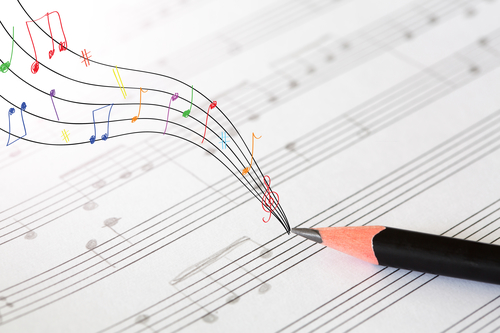
An excerpt by Wynn-Anne Rossi
There are too many lofty myths regarding original composition. It is true that Mozart wrote music (even a small concerto) before some of us could read. But you don’t have to be a Mozart to compose music. When we start a 5-year- old with piano lessons, we don’t expect that young pianist to mature into a Horowitz. We simply introduce the love of music, one tiny step at a time, surviving through years riddled with mistakes and ample poetic imagination.
Some Teaching Tricks
How do you begin? First and foremost, start early! Don’t wait. With my own students, composition is introduced as early as the first lesson. I encourage the young novices to explore creature sounds on the piano. Rabbits, horses—even aliens—can be assigned. I take five minutes at the end of each lesson to improvise with the students, encouraging them to feel comfortable making new sounds.
Two Mistakes
The most frequent mistakes young composers make? Too many ideas—or no ideas. “No ideas” is the easier of the problems to solve. You need only one idea for a composition, and an idea can be as short as three notes. If necessary, the musical idea can be composed during the lesson. Then the student can experiment with different octaves, different positions, backwards, upside- down, alternating rhythms, and much more. Having too many ideas is far more complex. Students are afraid their compositions will appear too simple, and thus, sound boring. I use the example of an architect with too many types of building materials. Using tree limbs, bricks, hay bales, paint cans, milk cartons, and Plexiglas would be a challenge even for Frank Lloyd Wright. Choose one or two, and you have a nice start towards building a decent structure.
Theory as a Tool
Teaching composition involves providing students with the proper tools. Scales, chord progressions, and arpeggios are effective building blocks. In Piano Adventures, the Creative questions found at the bottom of the page provide an excellent source of ideas that lead to composition. Each piece has a Discovery question that reviews or reinforces a theory concept. In each unit, a Creative question nudges the student toward application of the new concept in a personal, creative way. These tips and exercises introduce fundamental tools of composition, such as imitation.
In counter to the myths, original composition is not a journey limited to young Mozarts. All children are creative. They deserve the opportunity to finger-paint their way into their own priceless musical identities.
Wynn-Anne Rossi is a composer, author, performer, and educator with over 40 publications through the FJH Music and Boston Music companies. Commissions include works sponsored by Minnesota Public Radio, American Composers Forum, and the National Endowment for the Arts. She is creative consultant for the new St. Paul Chamber Orchestra CONNECT outreach curriculum. Wynn-Anne also performs her own music in the Minnesota public schools through the Bravo Music Program and as an active SPCO cultural partner.
6 replies on “Original Composition Dispelling Myths!”
Comments are closed


Hello Amber,
I´m glad discovering your ideas concerning improvisation. Some of my very young students (6-7 years) love it. So my question is: Where exactly can I find this:
“In Piano Adventures, the Creative questions found at the bottom of the page provide an excellent source of ideas that lead to composition.”?
I would be very thankful if you could sent me a link.
Thanks and kind:
Astrid
Dear Astrid,
I’m glad that your students are discovering the joy of improvisation. Creative and Discovery Questions can be found at the bottom of certain Lesson, Performance, and Technique and Artistry book pages. For example Pg. 19 and Pg. 42 of Lesson Book, 2A.
Here is a link to the sample pages: https://pianoadventures.com/publications/piano-adventures-level-2a-lesson-book-2nd-edition/
All my best,
Amber
Hello Amber,
thanks for your fast and friendly answer! The link seems very helpful and I will try this exercices with my students.
I have to say, that I my students and I really enjoy working with pianoadventures. The moment I work with four of christmas song books (level 2a-4). The songs are amazing arranged and the same time highly professional edited. Moreover I appreciate the very didactical system of the series, that I can´t find in any German piano literature. If the books were also available in German language, I could systematically start also with the very young pupils here in Munich where I teach. Might there be considerations to publish the books also in German language?
Again: Thanks for your answer!
Astrid
Hi Astrid,
I’m happy to share that we do have the basic Piano Adventure series available in German. You can find the books and the Piano Adventure German catalogue here: https://pianoadventures.de
All best on your musical adventure!
Hi Amber, via internet I found only the english page. Thanks for the link, that´s wonderful!
Hi Amber, via internet I found only the english page. Thanks for the link, that´s wonderful!